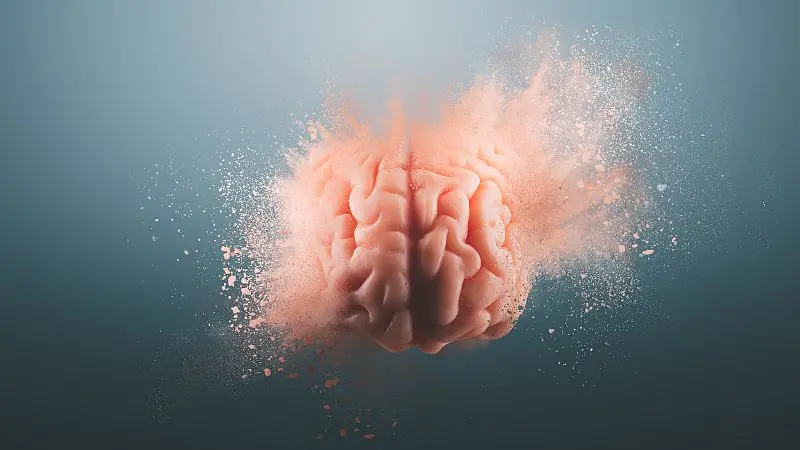Lifestyle-Health
Is ‘brain rot’ real? Experts weigh on on the impact of excessive screen time on our brains

Doomscrolling. Instagram obsessions. Mindless YouTube video viewing. Distracting behaviours, yes, but can they actually rot a person’s brain?
Last year, Oxford University Press designated “brain rot” as its word of the year, defining it as the “supposed deterioration of a person’s mental or intellectual state” caused by overconsuming “trivial or unchallenging” material found on social media and other online platforms.
“It’s what happens when you consume too much low-quality online content, which is like junk food for the brain,” said Dr Andreana Benitez, an associate professor in the Department of Neurology at the Medical University of South Carolina in the United States.
But whether that content is actually harming the brain – and how – remains unclear.
Screen habits can shape health
According to the US Centers for Disease Control and Prevention (CDC), half of teenagers in the US spend four hours or more looking at screens each day, and global estimates suggest adults may be online an average of more than six hours per day.
There are no federal health guidelines for how many hours of daily screen time are appropriate for teens or adults.
Researchers lack sufficient data to fully understand the concept of brain rot and what it might lead to.
“There really isn’t a coherent science around it,” Benitez said.
There is, however, CDC data showing that 1 in 4 teenage frequent scrollers report feeling anxious or depressed.
Some research suggests problems with heavy online use may begin quite young. Adolescents who spend greater amounts of time in front of screens may be more likely to experience mental health issues, including depression, anxiety, attention-deficit/hyperactivity disorder, and oppositional defiant disorder, and related physical symptoms such as pain, dizziness, or nausea.
That’s according to a 2024 analysis of data from the Adolescent Brain Cognitive Development study, the largest long-term child brain development study in the US.
Other studies have potentially linked brain rot to emotional desensitization, cognitive overload, negative self-worth, and impaired executive function skills, including memory, planning, and decision-making.
Rethinking our digital diet
While there’s no evidence that hours of daily screen time are changing the structure of the human brain, it’s what’s not happening during those hours that could be harmful, especially for young people whose brains are still developing, said Dr Costantino Iadecola, director and chair of Feil Family Brain and Mind Research Institute at Weill Cornell Medical Center in New York City.
The more time young people spend in front of screens, the less time they spend being physically active or having face-to-face human interactions that supply the developing brain with critical, complex sensory and emotional input, he said.
“Brain development requires diversity of exposures,” Iadecola said.
“When you are on your phone, you are not getting these other experiences. We are substituting artificial interactions for human interactions, and artificial interactions lack the complexity of the human experience – the verbal, sensory, and emotional reactions we have after interacting with people”.
It’s not just screen time that matters – it’s also screen content, Benitez said.
“If you consume excessive amounts of low-quality online content, you are more likely to be exposed to information that might distort your perception of reality and harm your mental health,” she said.
Cycling through large amounts of negative content can also leave a person mentally exhausted, she said.
But how much is too much has yet to be determined, Benitez said. Sticking to her junk food analogy, she likened short periods of screen time to the occasional junk food snack.
“One bag of chips might not be that bad, but if you’re eating three at a time, that might be a problem,” she said.
How to have smarter screen time
Helping kids – and adults – consume a healthier online diet isn’t easy, Benitez said, because so much of modern life, from schoolwork to shopping, entertainment, and socializing, involves online applications.
“With kids, screens are a part of their lives,” she said. “It’s how they get a lot of information”.
But, she said, “it’s incumbent upon adults to curate the content, make sure they are consuming content that’s good for them and in a way that does not result in mental fatigue. We need to make sure they are engaging in critical thinking as they engage with screens”.
For both children and grown-ups, Benitez also cautioned against scrolling before bedtime.
“Consuming arousing information and being exposed to light when your body should be winding down for sleep might affect your sleep,” she said.
The American Academy of Pediatrics suggests families develop screen-time plans together and encourage usage that builds creativity and connections with family and friends.
It also suggests parents emphasise the importance of offline activities such as sports, music, art, and other hobbies.
The AAP also notes that some screen use may be “healthy and positive,” a point both Benitez and Iadecola agreed with.
“You could be consuming good content,” Benitez said. “There’s a value judgment in this”.
Iadecola suggested making sure online usage is “purpose-appropriate. It’s OK to use the technology for whatever task is at hand. The problem is when it becomes addictive behavior. Everything in moderation”.
-

 Lifestyle-Health7 months ago
Lifestyle-Health7 months agoInvesting ₹10,000 a month via SIP in this mutual fund would have swelled to ₹1.71 crore in 21 years. Check how
-

 Lifestyle-Health7 months ago
Lifestyle-Health7 months agoMultibagger small-cap stock under ₹50 jumps despite sell-off in Indian stock market
-

 News In Diaspora7 months ago
News In Diaspora7 months agoHotels and homes on Crete evacuated as wildfire burns out of control
-

 Breaking News4 months ago
Breaking News4 months agoIsrael Names 77 Countries That Boycotted Netanyahu’s UN Speech In Protest Over Gaza War
-

 Lifestyle-Health8 months ago
Lifestyle-Health8 months agoOgie Alcasid’s daughter Leila ties the knot in Australia
-

 Lifestyle-Health8 months ago
Lifestyle-Health8 months agoDriving Abroad: These 34 countries accept SA licenses
-

 Politics9 months ago
Politics9 months agoFinally Federal Government of Nigeria Assures Citizens, Says The President Isn’t Controlled by Any Cabal
-

 Lifestyle-Health5 months ago
Lifestyle-Health5 months ago11 signs of growth that you might have missed
-

 Breaking News5 months ago
Breaking News5 months agoVeteran actress, Peju Ogunmola, loses only child, Ayomikun
-

 Lifestyle-Health8 months ago
Lifestyle-Health8 months ago10 Unwritten Rules for Visiting Bali that Travelers Should Know
-

 Lifestyle-Health6 months ago
Lifestyle-Health6 months agoWhen to take time off and focus on yourself and your family
-

 Breaking News8 months ago
Breaking News8 months agoNeymar’s Net Worth in 2025: Football Career, Earnings, Endorsements, and More

